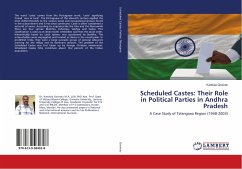The word 'caste' comes from the Portuguese word, 'casta' signifying 'bread, race or kind'. The Portuguese of the eleventh century applied the term indiscriminately to the various social and occupational groups found in the subcontinent and it has since continued. Caste is often considered a sub-unit of varna. According to scriptures like the Gita and the Manusmriti there are four varnas: Brahmin, Kshatriya, Vaishya and Sudra. This classification is used as an ideal model. Ambedkar said that the social order, hierarchically based on caste system, was questioned by Buddha. The untouchables were segregated and treated as slaves in the countryside. In pre-British India, they were a large outcaste group of general labourers working for the village and its dominant sections. The problem of the Scheduled Castes was first taken up by foreign Christian missionaries. Scheduled Castes (SCs) constitute about 16.2 percent of the Indian population.
Bitte wählen Sie Ihr Anliegen aus.
Rechnungen
Retourenschein anfordern
Bestellstatus
Storno








